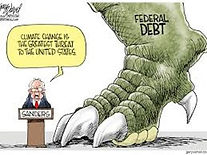National Issues
_edited.jpg)
WHAT IS RECISSION?
While the Big Beautiful Bill is being discussed in the Senate, the White House is expected to send Congress a rescissions package in the coming days, looking to reclaim congressionally approved funding in order to dramatically slash spending. While the administration faces legal challenges to its efforts to slash the U.S. Agency for International Development, public broadcasting and other programs, the White House is looking to Congress to formalize the rescission process.
This process is a way for Congress to cancel funds it previously appropriated but that the federal government has not yet spent, rendering the funds no longer available to departments, agencies and offices. Those funds can then be redirected elsewhere or sent to the Treasury general fund. This can be a powerful tool for improving society. It allows leaders to correct past mistakes, adapt to changing circumstances, and focus on what truly benefits the people.

Congress has the power of the purse under the U.S. Constitution, and each year, lawmakers approve funding to keep the federal government running. Those funds are then dispersed throughout government agencies and programs. The president can temporarily defer funds, or withhold them altogether — but only with Congressional approval.
Only discretionary funds can be rescinded. Mandatory spending, like Social Security and Medicare, cannot be.
To start the rescission process, the White House's Office of Management and Budget submits a formal rescission request to relevant committees in Congress, and the panels have 25 days to act on the package. It would then go to the House and Senate floors for expedited votes.
Overall, Congress has 45 days to act on the rescission request. And rescission bills are not subject to the 60-vote threshold needed to advance most legislation in the Senate. Instead, they only require a simple majority to pass.
House Speaker Johnson said it's his expectation that Congress will pass a rescissions package for fiscal year 2025 and may ask again in 2026."We have to reduce spending. I mean, it should even be a partisan proposition — it's something every American has to support," Johnson said.
The White House package is expected to ask Congress to cancel around $9 billion, seeking to make permanent some of the spending that Elon Musk and Pres. Trump's Department of Government Efficiency have slashed in recent months. The recission package would likely be only a fraction of the cuts. "This is just the first $9 billion — if we can't cut $9 billion, how are we going to cut $150 billion?" Sen. Jim Banks, an Indiana Republican, said.


Rescission has frequently been used in Congress to reallocate unspent funds. But requests from the White House come less frequently.
Since 1974, presidents have proposed nearly $92 billion in cuts through rescission packages, of which only $25 billion were accepted by Congress, according to the Government Accountability Office. During Pres. Trump's first administration, the Senate rejected a rescission package sent by the White House requesting nearly $15 billion in cuts. Since Republicans hold only a slim advantage, it will be interesting to see if Democrats are interested in cutting costs or licking their wounds.
I understand that Congress has their pet projects they want to protect, but due to the U.S. debt of $36+ trillion our congressmen need to make a sacrifice. DOGE has exposed all the fraud and fruitless, if not ridiculous, expenditures. We need to expect the Congress to work together to cut costs.
Rescission can be a good thing. It allows governments to respond to new challenges and adapt to evolving societal needs. For instance, the rapid advancement of technology has transformed many aspects of life, from communication to transportation. In response, some governments have rescinded outdated regulations that hinder innovation. This adaptability shows that government rescission can promote progress and align policies with the current needs of society, ultimately benefiting everyone involved.
Additionally, rescission can help address social injustices and promote equality. Historical examples, such as the abolition of discriminatory laws, highlight the importance of reversing harmful practices. In the United States, the Civil Rights Movement led to the rescission of laws that enforced segregation and discrimination.

In conclusion, government rescission plays a crucial role in correcting past mistakes. Many of Biden’s administration programs were funded to promote transgenderism, tax funded sex change, rescinding of parental rights, promotion of lesbian and gay rights and limiting and denying Christian and Jewish freedoms. These programs should be defunded. The ability to reverse ineffective or harmful policies allows for progress and improvement in society, adapting to new challenges, and promoting social justice.
Will Congress be willing to cut costs? Will Democrats hold hands and resist after discovering that $200 billion in COVID-relief funds were spent by public schools and none of the money went to educate students, LGBTQ+ advocacy in Guatemala cost taxpayers $2 million, and LGBTQ+ advocacy in Latin America and the Caribbean cost $5.7 million. Why? Why do they persist in spend, spend, spend?
I guess we will wait and see.
KLN
But all things must be done appropriately and in an orderly manner.
1 Corinthians 14:40 Amplified Bible